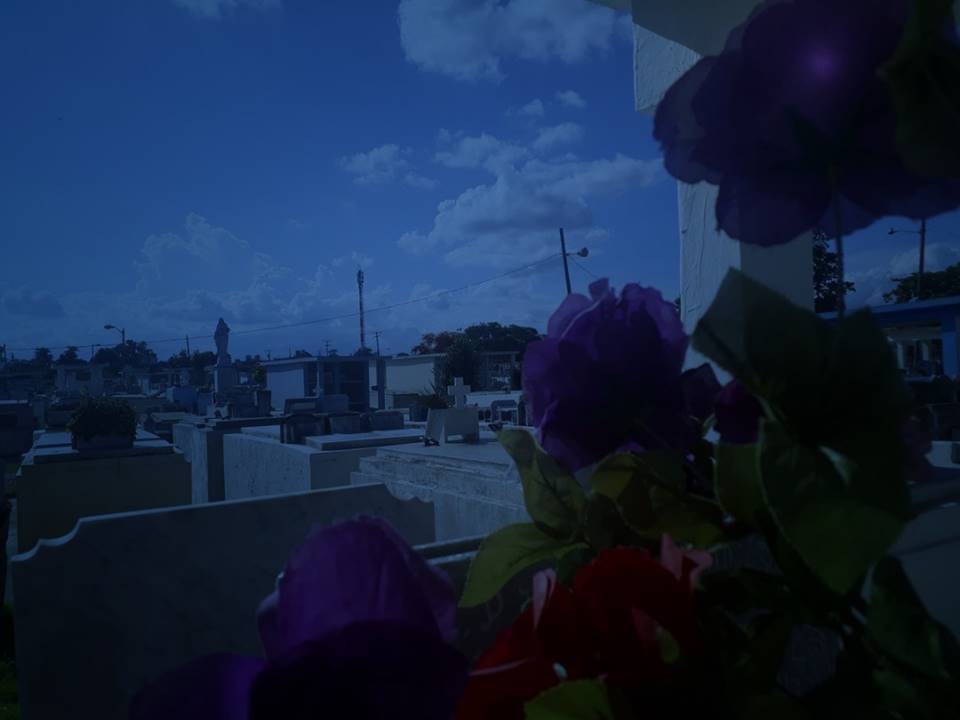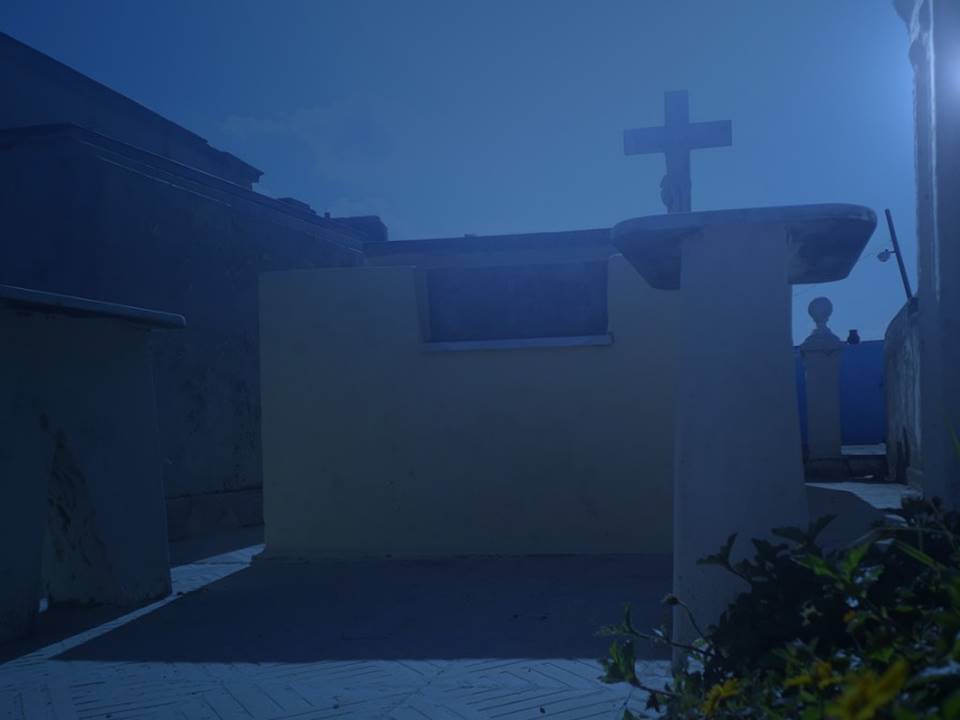ENGLISH VERSION (click here!)
The story I will tell is based on true events and dates back to 1990. They say that writers are photographers of reality, so instead of printing images on paper, we imprint them in the minds of our readers. We hear or see and then write. There are stories that should not be captured in books or digital files, to die in the minds of the old. There are those who prefer to listen to them. I only ask you, my reader friend, that what you will begin to read will provoke repulsion, disgust, terror. Then do not say that you were not warned. You can ignore it at this point. Are you still reading? That's up to you. In the town of Puerta de la Vega, as the territory in which the story is set is known, there was a cemetery, but there was not much cement in it. It looked rather rudimentary. Few graves had a tombstone or any wall describing the family name. Right there, in a board hut, was the lookout. His name was Brunildo, son of Jacinta and Bartolo, who had died two years earlier of parasitism. The boy had always been "half-witted", as they used to say in the village, and his parents only wanted him to be able to work in something that would contribute to his upkeep. His job in the cemetery was to keep animals out. There was a fence and only one gate, which was locked, for fear of buffaloes entering. Brunildo's salary was meager. People marveled that he was not skinny, like almost everyone in the village.

La abuela del muchacho, una brujera muy conocida del pueblo, le dijo a su madre que se deshiciera del muchacho, que algo malo habitaba en él, pero Brunildo había sido el único hijo, después de doce barrigas infructuosas. Poco tiempo después la vieja murió, pero sentenció a la madre de la criatura que su hijo había nacido y que en otra vida había sido uno de los animales más asquerosos que habitaban el planeta Tierra.
Cuando este muchacho creció siempre andaba merodeando el cementerio, aprendió Matemáticas gracias al sepulturero del pueblo, que tenía contadas las tumbas y hacía que Brunildo las contara cada semana, para el registro del lugar. Un día este viejo apareció muerto y como los políticos del territorio no tenían a nadie para custodiar el cementerio, preguntaron en el pueblo, mas nadie deseó pasar una noche en el lugar, pues salían luces, se escuchaban ruidos. La ignorancia es la madre de la superstición. Dos vecinos sugirieron al hijo de Jacinta, el único muchacho medio bobo que se atrevería a estar allí. Otro señor alegó que ese muchacho trabajaba con el sepulturero y dominaba los datos del lugar. Fueron a hablar con los padres y Brunildo aceptó. A fin de cuentas, cobraría dinero por ello.
The boy's grandmother, a well-known witch of the village, told his mother to get rid of the boy, that something evil was in him, but Brunildo had been the only son, after twelve unsuccessful pregnancies. A short time later the old woman died, but sentenced the mother of the child that her son had been born and that in another life he had been one of the most disgusting animals that inhabited the planet Earth.
When this boy grew up he was always hanging around the cemetery, he learned mathematics thanks to the town gravedigger, who counted the graves and made Brunildo count them every week, for the registry of the place. One day this old man appeared dead and as the politicians of the territory had no one to guard the cemetery, they asked in the town, but no one wanted to spend a night in the place, because lights came out and noises were heard. Ignorance is the mother of superstition. Two neighbors suggested Jacinta's son, the only half-witted boy who would dare to be there. Another man claimed that the boy worked with the gravedigger and knew the facts about the place. They went to talk to the parents and Brunildo agreed. After all, he would charge money for it.
ENGLISH VERSION (click here!)

El muchacho estaba muy feliz, algo que extrañó al padre y hasta un gaznatón le dio. ¿Cómo iba a sonreír por trabajar en el cementerio? Pero el chico entretenido sabía el por qué de su alegría. Tenía 17 años y ya esa noche empezaría a trabajar.
Pasaron unos meses y la gente del pueblo lo veía caminar meditabundo, observando a las personas con cierto misterio. A los niños les decían que si no se portaban bien, iban a llamar a Brunildo. ¡Temblaban! Así fue distanciándose el muchacho, murieron sus padres. Algunos vecinos se extrañaron de cómo los enterró sin llorar, como enmudecido. Brunildo se fue a vivir a la caseta del cementerio. Por el día, chapeaba el lugar, sembraba flores. Con el paso del tiempo, el cementerio estaba poblado de flores muy coloridas: bicarias, rosas, maravillas, marpacíficos, cajigales… La gente se maravillaba de ver cómo el “bobo” tenía el lugar. Algunos le pagan pocos quilos para que les limpiara o pintara la tumba de la familia, a lo que Brunildo accedía.
The boy was very happy, something that the father missed and even gave him a gaznaton. How could he smile about working in the cemetery? But the amused boy knew why he was so happy. He was 17 years old and already that night he would start working.
A few months went by and the townspeople watched him walk meditatively, observing the people with a certain mystery. The children were told that if they didn't behave, they would call Brunildo. They trembled! As the boy grew distant, his parents died. Some neighbors were surprised at how he buried them without crying, as if mute. Brunildo went to live in the cemetery hut. During the day, he mowed the place, planted flowers. As time went by, the cemetery was full of colorful flowers: bicarias, roses, marigolds, marpacíficos, cajigales... People were amazed to see how the "bobo" had the place. Some paid him a few pounds to clean or paint the family tomb, to which Brunildo agreed.
ENGLISH VERSION (click here!)
Pero la abuela tenía razón: algo no andaba bien en aquel muchacho de tez negra y ojos color almendra seca, de mediana estatura y uñas amarillas, de mirada penetrante y voz poco escuchada. Ella lo advirtió, mas no le hicieron caso. Los viejos son sabios, sobre todo la brujera más conocida del lugar, pero también quien ayudaba a que las mujeres de la Puerta de la Vega, dieran a luz muchachos sanos. Por la única criatura que no se alegró en su vida, fue por su nieto. La vieja tembló, según el padre de Brunildo. A los pocos meses, murió.
¿Qué pasaba con aquel muchacho? ¿Qué hacía realmente? ¿Cómo murió? Es motivo para otro post. Espero tu lectura.
Las imágenes utilizadas en la publicación fueron tomadas con mi móvil Samsung Galaxy J7 Prime. Textos llevados al Inglés por [Deepl Traslate](https://www.deepl.com/mobile-apps/?utm_source=android&utm_medium=app&utm_campaign=share-with-friends).
But the grandmother was right: something was not right about that boy of black complexion and dry almond-colored eyes, of medium height and yellow nails, with a penetrating look and a voice that was not heard very often. She warned him, but he was ignored. The old men are wise, especially the best known witch of the place, but also the one who helped the women of the Puerta de la Vega to give birth to healthy boys. The only creature she was not happy for in her life was her grandson. The old woman trembled, according to Brunildo's father. A few months later, he died.
What was wrong with that boy? What was he really doing? How did he die? That's a subject for another post. I look forward to reading it.
The images used in this post were taken with my Samsung Galaxy J7 Prime cell phone. Texts translated into English by [Deepl Translate](https://www.deepl.com/mobile-apps/?utm_source=android&utm_medium=app&utm_campaign=share-with-friends).
ENGLISH VERSION (click here!)
 [](https://vote.hive.uno/@hivecuba) 